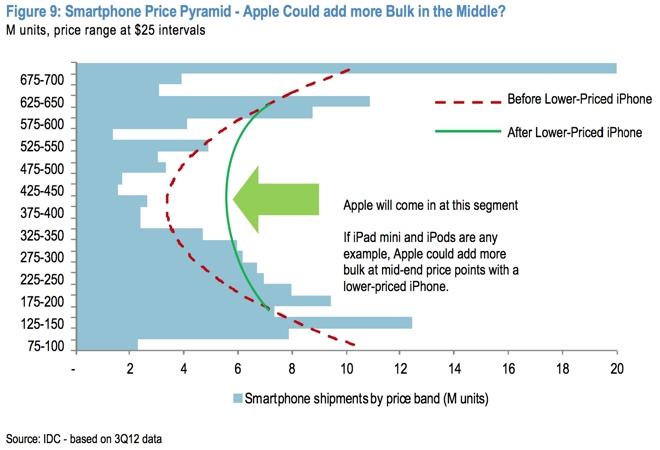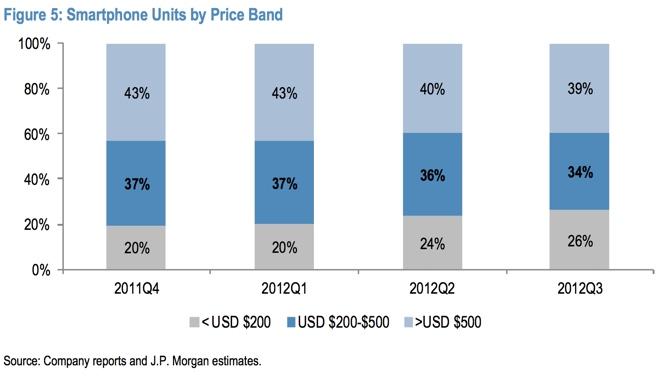Apple surprised many last year when it priced the iPad mini at $329 — more than $100 higher than the Amazon Kindle Fire and Google Nexus 7. But the same premium approach will probably be used to successfully introduce a more affordable iPhone, a new analysis concludes.

This week, Mark Moskowitz and Gokul Hariharan of J.P. Morgan took a stab at the prospect of a low-cost iPhone. They expect that Apple would sell such a device in the second half of 2013 priced between $350 and $400 — a cost that may prove higher than some market watchers expect.
But rather than be disappointed by those price points, investors should look to the iPad mini as a "winning template" for Apple's strategy, Moskowitz and Hariharan argue. Instead, they believe a contract-free iPhone priced under $400 would be a "very attractive" product for many consumers.
An iPhone priced between $350 and $450 could also affect market trends and lower what J.P. Morgan calls the "smartphone price pyramid." Moskowitz and Hariharan said that while currently mid-level smartphones don't see much volume, Apple could change the market trends with a reasonably priced iPhone — just like the company has done in the past with the iPad and iPod.
"Apple usually creates new demand when it steps into a price band — for example, the $300-$400 price range for tablets did not have much demand (most of the growth had been at the $499+ or $199 range) before the launch of the iPad mini," they wrote. "However, after the launch of Pad mini, this segment has become one of the largest parts of the market, even convincing many suers to upgrade from cheaper tablets to the iPad mini."

Apple's current crossroads in the smartphone market is similar to where the company was 30 years ago in the PC space, Moskowitz and Hariharan believe. At one point, Apple had more than a quarter of the PC market, but it faced competition from IBM PC clones and Microsoft's Windows platform.
"If Apple doesn't move into the mainstream, then its ecosystem advantage (already has more than 300 million iCloud users) is likely to be eroded by Android, which is growing very quickly," they said. "The move to lower price points may come at the expense of margins in the short term, but we believe that the opportunity to expand the iOS ecosystem could pay off in the long term through non-product revenue streams."
Multiple rumors have pegged the launch of a low-cost iPhone for later this year. Market watchers believe Apple will be compelled to launch such a product, particularly to gain market share in emerging markets like China and Brazil, where customers do not typically purchase phones with a contract subsidy.
One projection from last month suggested a low-cost iPhone could net Apple 11 percent share of that market segment by 2014. But many others outside of Moskowitz and Hariharan have called for Apple to launch an iPhone in the $300 price range, slightly below what J.P. Morgan expects.